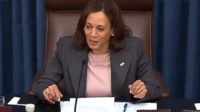In accepting the Democratic Party's nomination for president Aug. 22, Vice President Kamala Harris focused her remarks on her middle-class roots and a commitment to equity and integrity of U.S. democracy, but she did not mention infrastructure and commented only briefly on environmental and energy policy—leaving observers to question how her positions would change from those of President Joe Biden if she succeeded him.
Earlier in the week at the Democratic National Convention in Chicago, Biden highlighted major investments made in infrastructure and efforts to address climate change during his presidency.
Biden characterized Harris’ approach as largely a continuation of his own efforts, which have included signing into law some of the largest investments in infrastructure, environmental justice and climate change in U.S. history—including landmark project funding laws such as the CHIPS Act, Infrastructure Investment and Jobs Act and the Inflation Reduction Act.
The Democratic National Committee has not updated its party platform from policies outlined by the Biden-Harris ticket, and Harris has not yet explained in what ways her approach would differ from Biden's.
Some energy sector participants and observers have noted her changed stance on hydraulic fracking of oil and gas since her 2019 position that it should be banned in the U.S.
In comments to CBS News late on Aug. 22, Pennsylvania Gov. Josh Shapiro (D), a one-time potential presidential rival who also was considered for vice president, noted the state's "all of the above" position on energy sources, since it is a major U.S. natural gas exporter. He noted how Harris "listened" to concerns raised by such a ban in visiting one major energy producing area of the state, and "now wants to continue natural gas extraction." Added Shapiro: "I appreciate the fact that she listened and her position evolved."
But some climate change activists who are not happy with Harris' evolution on fracking, have yet to publicly endorse her ticket but are not yet vocal in their opposition. "We would like to see more from her on climate,” said Collin Rees, political director of Oil Change U.S. In a statement, Harris-Walz campaign spokesperson Seth Schuster did not comment on the fracking position but said she was “focused on a future where all Americans have clean air, clean water, and affordable, reliable energy while [former President Donald] Trump continues to call climate change a ‘hoax,’" and would "gut" clean energy funding laws.
The campaign has emphasized Harris's tie-breaking vote for the Inflation Reduction Act in 2022, which it says has helped spur 300,000 new energy jobs and lawsuits she filed against state-based energy firms for California environmental damage when she was a prosecutor.
In her acceptance, Harris described her upbringing in a “beautiful, working-class neighborhood” and a commitment to policies that support middle class growth. “As president, I will bring together labor and workers, small business owners, entrepreneurs and American companies—to create jobs, grow our economy and lower the cost of everyday needs,” she said.
She stressed her commitment to law and order, highlighting successes in her career as a California prosecutor, including a $20-billion settlement with the banking industry following the 2008 financial crisis to provide debt relief for people at risk of losing their homes and lawsuits filed against energy producers for environmental damage she alleged they caused in the state, similar to suits filed by other states and municipalities.
Harris vowed to address the immigration crisis at the U.S. border with Mexico, promising to both create “an earned pathway to citizenship, and to secure our border.”
But her comments for the most part did not unveil specific policy goals, focused instead on unity for a divided country.
“I see a nation ready to move forward ... an America where we look out for one another and recognize that we have so much more in common than what separates us," Harris said. "None of us has to fail for all of us to succeed.”






